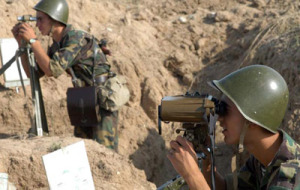EEU untied Azerbaijan’s hands: attacks will continue
15:42, January 8, 2015 | News, Other news | Rights of Soldiers/Recruits | Armed Forces, Customs union The current tension on the Armenian-Azerbaijani border has resulted from the incompetent, poor and weak-willed foreign policy of the Armenian authorities. This opinion is held by Artur Sakunts, Chairman of the Helsinki Citizens’ Assembly Vanadzor who in his interview to Lragir.am mentioned that such incidents are inevitable as a consequence of Armenia’s isolation from the international community.
The current tension on the Armenian-Azerbaijani border has resulted from the incompetent, poor and weak-willed foreign policy of the Armenian authorities. This opinion is held by Artur Sakunts, Chairman of the Helsinki Citizens’ Assembly Vanadzor who in his interview to Lragir.am mentioned that such incidents are inevitable as a consequence of Armenia’s isolation from the international community.
“In this case, the direct responsibility for the victims falls on the Armenian leadership. They must know that this is the result of their foreign policy,” said Sakunts.
When considering the Armenian security issue in the context of the Eurasian Economic Union, Sakunts observed that the EEU was both an isolated, and isolating and opposing union. By joining the Union, the security guarantees for Armenia offered by the broad international cooperation decreased, and the country became more vulnerable.
“Regrettably, the tension will continue at this stage as now Azerbaijan feels freer dealing with Armenia not integrated into the international community, but rather isolated. Moreover, Azerbaijan realizes that Armenia is not only isolated but also subject to Russia that opposes the international community. Given this, Azerbaijan reserves itself a considerable right to treat the international agreements, including the ceasefire agreement, in such an irresponsible manner”, he said.
According to Sakunts, Azerbaijan’s behavior and approaches are closer to the logic behind the EEU, as compared with Armenia. In these terms, the situation is very complicated as Aliyev’s Azerbaijan can reach understanding with Putin’s Russia much easier than Armenia can.
Sakunts also noted that despite the claims of the Armenia’s authorities, Armenia’s security issue is unresolved either within the CSTO or the EEU. As before joining the EEU Armenia developed other relationships with the European Union and the World Trade Organization, i.e. the degree of the international integration was of a quite different nature, such diverse cooperation used to be one of the key security guarantees.
“And nowadays, given the current isolation – and the EEU is an economically isolated structure seeking critical political goals to oppose the international integration processes – the security risks will inevitably grow. In this case, even the CSTO cannot guarantee safety. We can see it quite clearly that the CSTO is a mechanism in the hands of Russia; however, this security mechanism can have no effect without the economic component”, he said.
According to Sakunts, the value system and attitudes underlying the EEU will exert a substantial and fundamental influence on the political situation, including the external and internal situation. “In other words, the Union will not serve as a problem-solving formula. Therefore, it makes no sense to consider it as an instrument of security; moreover, it must be viewed as a threat in terms of security”, emphasized he.
